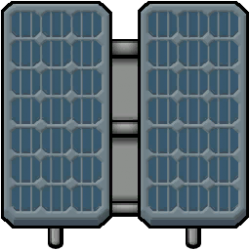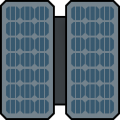Difference between revisions of "Solar generator"
m (→Analysis: x) |
|||
| (12 intermediate revisions by 5 users not shown) | |||
| Line 1: | Line 1: | ||
| − | + | {{infobox main|building| | |
|name = Solar generator | |name = Solar generator | ||
|image = Solar generator.png|128px{{!}}Solar generator | |image = Solar generator.png|128px{{!}}Solar generator | ||
| Line 8: | Line 8: | ||
|path cost = 50 | |path cost = 50 | ||
|passability = pass through only | |passability = pass through only | ||
| + | |blockswind = false | ||
|cover = 0.5 | |cover = 0.5 | ||
|minifiable = false | |minifiable = false | ||
| Line 23: | Line 24: | ||
|resource 2 = Component | |resource 2 = Component | ||
|resource 2 amount = 3 | |resource 2 amount = 3 | ||
| − | }} | + | }}A '''solar generator''' generates [[power]] from sunlight. |
| − | ==Acquisition== | + | == Acquisition == |
| − | + | {{Acquisition}} | |
| − | ==Summary== | + | == Summary == |
{{stub|section=1|reason=Need analysis of how latitude affects power generation and graph of daily light cycle}} | {{stub|section=1|reason=Need analysis of how latitude affects power generation and graph of daily light cycle}} | ||
| − | Power | + | Solar generators produce up to 1700 W of [[power]] at 100% natural [[light]]. Power is a direct product of light level; for example, 50% daylight gives 850 W. An [[eclipse]] blocks the sun, but [[weather]] conditions like rain, fog, or snow will ''not'' reduce any power. A [[roof]] reduces power output, proportional to the tiles covered. However, there's no "overshadow" from mountains, despite any graphics of long shadows seen in the game. |
| − | [[ | ||
Solar generators only operate by the world light level; light from ordinary sources such as a [[standing lamp]] or [[sun lamp]] will not cause them to generate power. The latitude of your starting position will affect solar cycles, with equator zones giving the strong consistent output and the north pole struggling to reach peak output. | Solar generators only operate by the world light level; light from ordinary sources such as a [[standing lamp]] or [[sun lamp]] will not cause them to generate power. The latitude of your starting position will affect solar cycles, with equator zones giving the strong consistent output and the north pole struggling to reach peak output. | ||
| − | Lightning striking causes | + | Lightning striking causes the generator to create a small amount of power. |
| − | ==Analysis== | + | == Analysis == |
| − | + | Solar generators are "free" energy; once built, they do not need fueling, they simply give and keep giving... while they have sunshine. They do not give their maximum power from start to finish; as daylight grows, the power they provide slowly grows to their full capacity, and then tapers off again back to zero as dusk and night approach. | |
| − | Solar generators are "free" energy; once built, they do not need fueling, they simply give and keep giving... while they have sunshine. They do not give their maximum power from start to finish; as daylight grows, the power they provide slowly grows to their full capacity, and then tapers off again back to zero as dusk and night approach | ||
| − | + | The exact amount of sun depends on your latitude and season. In a single day near the equator, there are roughly: | |
| + | *9 hours of full sunlight - from 0800 to 1700 | ||
| + | *8 hours of no sunlight - from 2000 to 0400. | ||
| + | *7 hours of reduced sunlight - from 0400 to 0800, and 1700 to 2000. | ||
| − | + | [[Batteries]] are the easiest way to make power consistent, allowing power use at night, so long as an [[eclipse]] or [[short circuit]] doesn't happen. | |
| − | + | Alternatively, you can accept that not all items need to be powered 24/7. Most production benches are only used when colonists are awake, and many buildings like [[Electric smelter|smelters]] and [[Electric crematorium|crematorium]]s don't need to be used daily. The most pertinent case is with [[sun lamp]]s, which shuts down as night begins. Two solar generators will roughly power a sun lamp. However, the solar generator's full output doesn't always align with the sun lamp's on period, so batteries remain helpful. | |
| − | ==Version | + | ===Comparison=== |
| + | Compared to [[wind turbine]]s, solar generators take up less space (so are easier to protect) and provide fairly consistent power. While wind works day and night, even with a [[battery]], power may turn off randomly at a crucial moment. However, using solar requires research, and they consistently shut off at night, or during an [[eclipse]]. | ||
| + | |||
| + | It is worth noting that solar generators are low-lying - you can place them in front of a wind turbine, without blocking the wind. | ||
| + | |||
| + | == Version history == | ||
<gallery> | <gallery> | ||
SolarCollector.png|Original sprite | SolarCollector.png|Original sprite | ||
</gallery> | </gallery> | ||
| + | |||
{{nav|power|wide}} | {{nav|power|wide}} | ||
| − | |||
[[Category:Power]] | [[Category:Power]] | ||
Latest revision as of 12:37, 27 September 2024
Solar generator
Produces electricity from sunlight. Does not work in the dark or under artificial light.
Base Stats
Building
- Size
- 4 × 4
- Minifiable
- False
- Placeable
- True
- Passability
- pass through only
- Cover Effectiveness
- 50%
- Blocks Wind
- False
- Terrain Affordance
- Medium
- Power
- 1700 W
Creation
- Required Research
- Solar panel
- Skill Required
- Construction 6
- Work To Make
- 2,500 ticks (41.67 secs)
A solar generator generates power from sunlight.
Acquisition[edit]
Solar generators can be constructed once the solar panel research project has been completed. Each requires ![]() 100 Steel,
100 Steel, ![]() 3 Components, 2,500 ticks (41.67 secs) of work modified by the construction speed of the builder, and a construction skill of 6.
3 Components, 2,500 ticks (41.67 secs) of work modified by the construction speed of the builder, and a construction skill of 6.
Once constructed, they cannot be re-installed, they can only be deconstructed.
Summary[edit]
| This section is a stub. You can help RimWorld Wiki by expanding it. Reason: Need analysis of how latitude affects power generation and graph of daily light cycle. |
Solar generators produce up to 1700 W of power at 100% natural light. Power is a direct product of light level; for example, 50% daylight gives 850 W. An eclipse blocks the sun, but weather conditions like rain, fog, or snow will not reduce any power. A roof reduces power output, proportional to the tiles covered. However, there's no "overshadow" from mountains, despite any graphics of long shadows seen in the game.
Solar generators only operate by the world light level; light from ordinary sources such as a standing lamp or sun lamp will not cause them to generate power. The latitude of your starting position will affect solar cycles, with equator zones giving the strong consistent output and the north pole struggling to reach peak output.
Lightning striking causes the generator to create a small amount of power.
Analysis[edit]
Solar generators are "free" energy; once built, they do not need fueling, they simply give and keep giving... while they have sunshine. They do not give their maximum power from start to finish; as daylight grows, the power they provide slowly grows to their full capacity, and then tapers off again back to zero as dusk and night approach.
The exact amount of sun depends on your latitude and season. In a single day near the equator, there are roughly:
- 9 hours of full sunlight - from 0800 to 1700
- 8 hours of no sunlight - from 2000 to 0400.
- 7 hours of reduced sunlight - from 0400 to 0800, and 1700 to 2000.
Batteries are the easiest way to make power consistent, allowing power use at night, so long as an eclipse or short circuit doesn't happen.
Alternatively, you can accept that not all items need to be powered 24/7. Most production benches are only used when colonists are awake, and many buildings like smelters and crematoriums don't need to be used daily. The most pertinent case is with sun lamps, which shuts down as night begins. Two solar generators will roughly power a sun lamp. However, the solar generator's full output doesn't always align with the sun lamp's on period, so batteries remain helpful.
Comparison[edit]
Compared to wind turbines, solar generators take up less space (so are easier to protect) and provide fairly consistent power. While wind works day and night, even with a battery, power may turn off randomly at a crucial moment. However, using solar requires research, and they consistently shut off at night, or during an eclipse.
It is worth noting that solar generators are low-lying - you can place them in front of a wind turbine, without blocking the wind.

